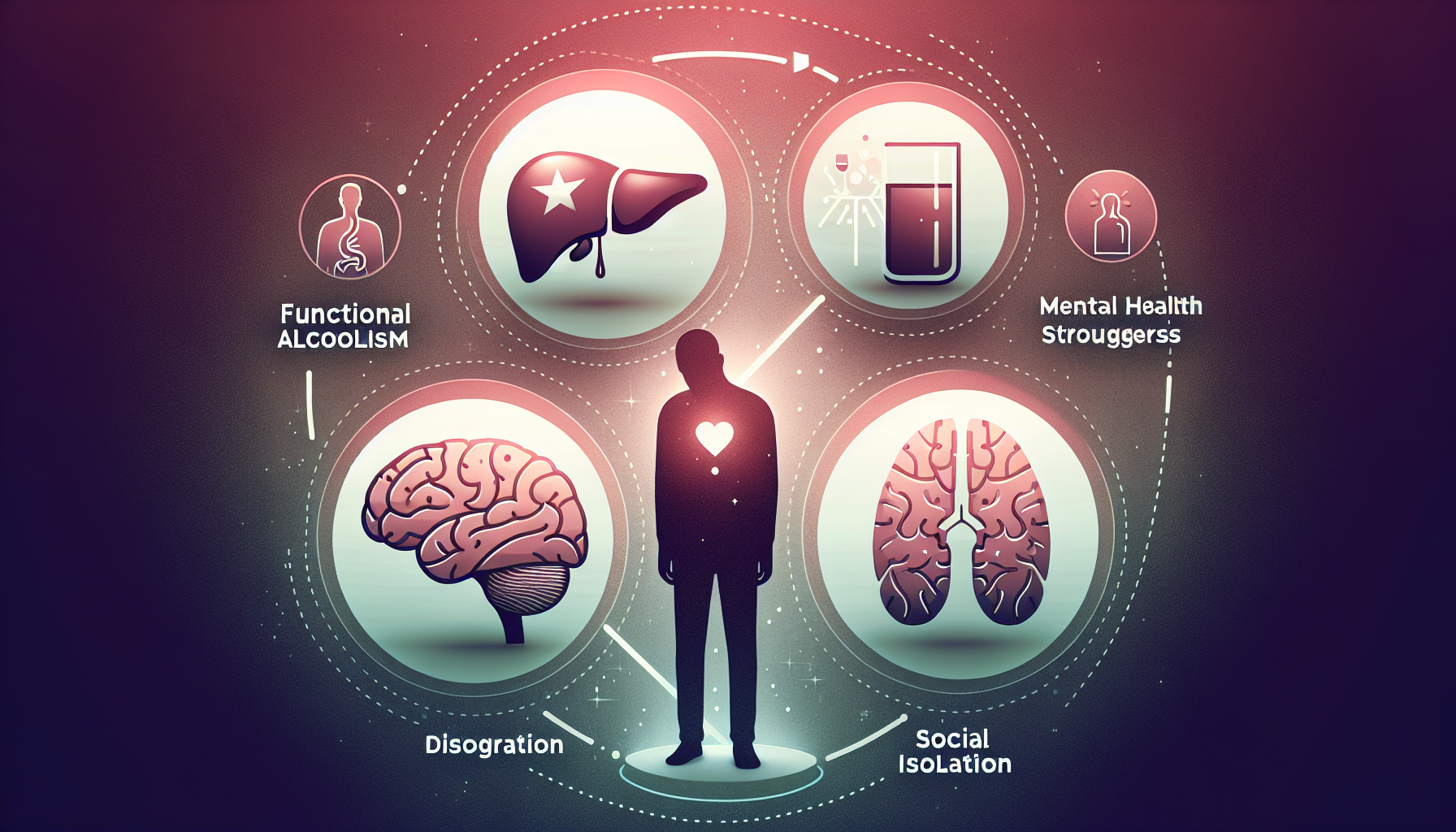Recognizing the Signs of a Functional Alcoholic: Key Indicators and Insights
- Aug 23, 2025
- 10 min read
Updated: Sep 1, 2025
A functional alcoholic manages to appear successful and keep up with daily duties while being dependent on alcohol. This facade makes it tough to spot their addiction. This article covers the signs of functional alcoholism, health risks, and ways to help. If you’re concerned about someone close to you, read on.
Key Takeaways
Functional alcoholism allows individuals to maintain responsibilities while being dependent on alcohol, making the condition difficult to identify.
Key indicators include high alcohol tolerance, personality changes, and deceit about consumption habits, which can lead to severe health consequences.
Early intervention and a combination of treatment options, including medication, therapy, and support groups, are crucial for effective recovery.
Understanding Functional Alcoholism

Functional alcoholism, often referred to as high-functioning alcoholism, is a form of alcohol use disorder where individuals manage to carry out their daily responsibilities despite their dependency on alcohol. High-functioning alcoholics maintain the facade of control over their drinking habits, often excelling in their professional and personal lives. This ability to manage life while coping with alcohol use disorder is both remarkable and dangerous, as it masks the severity of their condition. It is important to note that 'functional alcoholic' is not a formal medical diagnosis, but rather a descriptive term used to characterize certain drinking behaviors. A high functioning alcoholic can often go unnoticed due to their ability to maintain this facade.
They often hide their alcohol problems by maintaining good hygiene and steady jobs, making it challenging for others to recognize their struggles. To the outside world, functional alcoholics may appear to have everything under control, which makes it difficult for others to recognize their struggles. Engaging in social interactions without appearing intoxicated further complicates the recognition of their addiction. Even if there are no immediate external consequences, the internal impact of alcohol use can be significant. This concealment significantly hinders the identification and addressing of their alcohol dependency.
Understanding Alcohol Use Disorder
Alcohol use disorder (AUD) is a chronic, relapsing medical condition marked by an inability to control alcohol consumption despite experiencing negative consequences in daily life, relationships, and overall health. High functioning alcoholics, also known as functioning alcoholics, are individuals who struggle with AUD but manage to keep up appearances—often excelling at work, maintaining family responsibilities, and hiding their drinking problem from family members, friends, and colleagues.
According to the National Institute on Alcohol Abuse and Alcoholism, nearly 15 million Americans aged 12 and older are affected by alcohol use disorder, underscoring the widespread impact of this condition. High functioning alcoholism can be particularly difficult to detect, as these individuals may not fit the stereotypical image of someone with an alcohol problem. However, warning signs such as heavy drinking, drinking heavily on a regular basis, and experiencing withdrawal symptoms when not drinking can indicate a deeper issue.
Medical professionals play a vital role in diagnosing and treating alcohol use disorder. Recognizing the early warning signs of high functioning alcoholism is essential for timely intervention and support. If you or someone you know is struggling with alcohol use, seeking help from a healthcare provider or addiction specialist can make a significant difference in recovery and long-term well-being.
Key Indicators of Functional Alcoholism
Identifying functional alcoholism can be challenging because individuals can mask their drinking problem. Key indicators include a high tolerance for alcohol, allowing them to consume alcohol in larger quantities without obvious signs of impairment. This tolerance often leads to excessive drinking patterns, which can be a red flag.
Personality changes when consuming alcohol are another indicator. Functional alcoholics may use alcohol to manage stress and discomfort, leading to noticeable shifts in behavior. Often, they lie about or hide the extent of their alcohol consumption, making it difficult for friends and family to recognize the severity of the problem and perpetuating misconceptions about their condition.
Unlike traditional alcoholics who exhibit overt signs of addiction, high-functioning alcoholics often appear physically and mentally healthy, maintaining jobs and educational success despite their issues with alcohol. Recognizing these subtle signs is crucial for early identification and intervention. It is important to remember that drinking alcohol, even without obvious outward symptoms, can still pose significant health risks and lead to serious consequences.
Functional Alcoholism vs. Traditional Alcoholism
High-functioning alcoholism and traditional alcoholism differ significantly in behavior and recognition. High-functioning alcoholics often hide their drinking habits effectively, making it difficult to identify their symptoms. This concealment makes high-functioning alcoholism more dangerous, as it can go unnoticed for longer periods.
While a non high functioning alcoholic typically exhibits more overt symptoms of addiction, such as isolation, physical signs, and disruptive behavior that impacts responsibilities, relationships, and daily life, functional alcoholics seem to manage their responsibilities well. However, despite their apparent success, high-functioning alcoholics may face a decline in work or academic performance due to their drinking habits and the underlying alcohol addiction.
Understanding these differences is key to recognizing and addressing functional alcoholism. Both high-functioning and non high functioning alcoholics may fall under the broader category of substance use disorder, which requires professional assessment for proper diagnosis and treatment.
Health Consequences of Functional Alcoholism

High-functioning alcoholics are not immune to the severe health consequences of alcohol abuse, despite their ability to appear successful. Heavy alcohol consumption significantly raises the risk of numerous physical ailments, including liver disease, pancreatitis, and various types of cancer. The internal damage caused by alcohol, particularly to organs like the liver and heart, may go unnoticed until serious complications arise. Alcohol dependence can lead to a range of serious health issues, even if outward signs are not immediately visible.
Mental health issues are also prevalent among high-functioning alcoholics. Functional alcoholism often co-occurs with mental health conditions such as depression or anxiety. Anxiety and depression commonly coexist with alcohol use disorder, each influencing the development of the other. High-functioning alcoholics may face significant mental health challenges, including heightened risks for anxiety and depression. These mental health problems can complicate their condition, making it harder to recognize and treat.
Memory lapses or blackouts often occur for high-functioning alcoholics, indicating heavy drinking and the potential for severe health issues over time. The delayed recognition of their problem due to their maintained lifestyle can lead to severe consequences for their physical and mental health, as well as their relationships.
Risk Factors and Causes of Functional Alcoholism
Several risk factors and causes contribute to the development of functional alcoholism. Genetic predisposition plays a significant role, accounting for 50% to 60% of susceptibility to alcohol use disorder, making some individuals more vulnerable to developing problematic drinking behaviors. A family history of substance abuse can also increase the risk of developing functional alcoholism.
Environmental factors, including social surroundings and stressful life events, also contribute significantly to functional alcoholism. Stressful experiences, particularly during childhood, can increase the risk of developing alcohol dependency. Recognizing these risk factors is crucial for addressing the root causes of functional alcoholism effectively. Access to human services and support systems can play a crucial role in prevention and early intervention.
Early Intervention: Why It’s Crucial
Preventing the escalation of functional alcoholism into more severe disorders requires early intervention. Encouraging individuals to consult their GP can lead to appropriate assessment and treatment options, potentially preventing long-term health issues. Medical professionals typically conduct thorough assessments to identify significant alcohol-related issues before engaging in therapy.
Self-help groups, such as Alcoholics Anonymous, provide emotional support and shared experiences, which are vital for recovery. If you suspect you or a loved one may be struggling with an alcohol use disorder, consider seeking a professional assessment and support. Early intervention safeguards an individual’s health and increases the likelihood of successful recovery.
Treatment Options for Functional Alcoholism

Various treatment options are available for functional alcoholism, including medications, therapy, and self-help groups. Alcohol addiction treatment can take place in a variety of settings, such as inpatient, outpatient, and specialized treatment facilities, allowing for tailored recovery programs based on the individual's needs. A healthcare professional can evaluate the severity of the alcohol problem and determine the most appropriate treatment. Depending on individual needs, treatment settings can range from inpatient and residential to outpatient and peer support groups.
After detox, continued support through therapy and participation in support groups is often necessary to maintain recovery. Each treatment approach addresses different aspects of alcohol use disorder, ensuring comprehensive care for the individual.
Medication-Assisted Treatment
Medications like Naltrexone and Acamprosate help ease withdrawal symptoms and curb cravings, making it easier for individuals to stop drinking. Disulfiram creates adverse reactions when alcohol is consumed, deterring individuals from drinking.
Under medical supervision, these medications can significantly aid in the recovery process by reducing cravings and managing alcohol withdrawal symptoms. Combined with other treatments, this approach provides a well-rounded strategy for overcoming alcohol dependency.
Therapy Approaches
Therapeutic approaches are essential in treating alcohol use disorders. Cognitive Behavioral Therapy (CBT) focuses on identifying and changing negative thought patterns, helping to prevent relapse. Motivational Enhancement Therapy aims to foster the individual’s motivation to change their drinking behavior.
Incorporating these therapies into a comprehensive treatment plan can significantly enhance commitment to recovery and provide the tools needed to maintain sobriety.
Support Groups and Peer Support
Support groups and peer support are vital in the recovery process. Groups like Alcoholics Anonymous, SMART Recovery, and Women for Sobriety offer different approaches and philosophies to support recovery, catering to various needs.
Participation provides encouragement, understanding, and accountability, essential for sustained recovery. Peer support helps individuals navigate daily life while maintaining sobriety, offering a sense of community and shared experience.
Recovery and Relapse Prevention
Recovery from alcohol use disorder is a journey that involves more than just stopping drinking—it requires a comprehensive approach that addresses both the physical and psychological aspects of addiction. High functioning alcoholics may find outpatient treatment programs especially beneficial, as these options allow them to continue managing daily tasks and responsibilities while receiving professional support.
American Addiction Centers and similar organizations offer a range of services, including medication-assisted treatment, cognitive-behavioral therapy, and self help groups, all designed to help individuals achieve and maintain sobriety. Support groups play a crucial role in recovery, providing encouragement, accountability, and a sense of community for those navigating the challenges of high functioning alcoholism.
Relapse prevention is a key component of long-term recovery. Understanding personal risk factors—such as certain drinking patterns or a high tolerance to alcohol—can help individuals identify triggers and develop effective coping strategies. The American Psychiatric Association emphasizes the importance of early intervention and ongoing support, both of which are essential for preventing relapse and promoting lasting change. By staying connected to support groups and maintaining a proactive approach to recovery, high functioning alcoholics may greatly improve their chances of long-term success.
Staying Sober
Staying sober is an ongoing commitment that requires attention to both mental health and lifestyle choices. High functioning alcoholics may need to reassess their relationship with alcohol and develop healthier ways to cope with stress, anxiety, and other emotions that can trigger cravings. Addressing underlying mental health issues is often a crucial step in maintaining sobriety and preventing relapse.
Support groups like Alcoholics Anonymous offer a valuable network of encouragement, understanding, and accountability. These groups provide a safe space to share experiences and challenges, helping individuals stay motivated and focused on their recovery goals. High functioning alcoholics may also benefit from incorporating regular exercise, balanced nutrition, and stress-reducing activities—such as meditation or yoga—into their daily routines.
The National Institute on Alcohol Abuse and Alcoholism recommends ongoing care and support for individuals with alcohol use disorder to prevent severe consequences, including liver disease, pancreatitis, and certain cancers. By prioritizing mental health and building a strong support system, functioning alcoholics can maintain sobriety and improve their overall quality of life.
Maintaining a Healthy Lifestyle
Maintaining a healthy lifestyle is a cornerstone of successful recovery from alcohol use disorder. For high functioning alcoholics, this means making conscious choices to support both physical and mental health. Eating a balanced diet, engaging in regular physical activity, and practicing stress management techniques—such as mindfulness, meditation, or yoga—can all contribute to a healthier, more fulfilling life.
It’s also important to reassess drinking habits and develop strategies to avoid situations that may trigger a return to alcohol use. This might involve steering clear of social events where alcohol is present or finding new, positive ways to cope with difficult emotions. The Centers for Disease Control and Prevention (CDC) offer guidance on responsible alcohol consumption and highlight the importance of moderation to prevent negative consequences.
Working closely with medical professionals can help individuals create a personalized treatment plan that addresses their unique needs and challenges. The Institute on Alcohol Abuse and Alcoholism recommends ongoing care and support to reduce the risk of mental health problems, relationship problems, and other severe health consequences associated with alcohol abuse and alcoholism. By making health and well-being a priority, high functioning alcoholics may achieve lasting recovery and enjoy a more balanced, rewarding life.
How to Help a Loved One Struggling with Functional Alcoholism

Helping a loved one struggling with functional alcoholism requires compassion and empathy. Many high-functioning alcoholics believe their lives are not impacted by their drinking, leading to further issues. Addressing the issue when the person is sober increases their receptiveness to help.
A non-judgmental and empathetic approach conveys genuine concern without placing blame, making it easier for the individual to accept help. Creating a support network is also important to avoid burnout and ensure sustained support for the loved one.
Al-Anon Family Groups offer support for family members affected by someone else’s drinking, providing a safe space for discussion and assistance.
Summary
In summary, recognizing the signs of functional alcoholism is essential for early intervention and effective treatment. High-functioning alcoholics can mask their addiction while maintaining daily responsibilities, making it challenging to identify their struggles. However, understanding the key indicators, health consequences, risk factors, and available treatment options can help in addressing this hidden condition.
By offering support and encouraging early intervention, we can help loved ones struggling with functional alcoholism find the path to recovery. Remember, the journey to sobriety is not something they have to face alone. Your support and understanding can make all the difference.
Frequently Asked Questions
What is a functional alcoholic?
A functional alcoholic is an individual who suffers from alcohol use disorder but continues to fulfill daily responsibilities while concealing their drinking habits. This duality can often make it difficult for them and others to recognize the severity of their condition.
What are the key indicators of functional alcoholism?
Key indicators of functional alcoholism include a high tolerance for alcohol, noticeable personality changes when drinking, secrecy about drinking habits, and the ability to maintain responsibilities despite alcohol use. Recognizing these signs is crucial for addressing potential issues.
How does functional alcoholism differ from traditional alcoholism?
Functional alcoholism differs from traditional alcoholism in that functional alcoholics can maintain their responsibilities and often conceal their drinking, whereas traditional alcoholics typically display more overt symptoms and disruptive behaviors.
What are the health consequences of functional alcoholism?
Functional alcoholism can lead to serious health issues such as liver disease, mental health problems like anxiety and depression, and cognitive impairments including memory loss. It's crucial to acknowledge these risks to safeguard your well-being.
What treatment options are available for functional alcoholics?
For functional alcoholics, effective treatment options comprise medication-assisted therapy, cognitive-behavioral therapy (CBT), motivational enhancement therapy, and participation in support groups like Alcoholics Anonymous. These approaches can help promote recovery and better management of alcohol use.



Comments